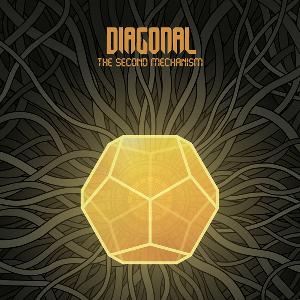
Album Review: Diagonal - The Second Mechanism
Progressive music walks a fine line for most of its existence, trying to balance the gratification musicians garner from playing difficult and involved compositions with the gratification listeners need to be able to elicit from those same songs. Finding the right mix of challenge for the player and fun for the audience is a bit of a magic trick, not unlike pulling a rabbit out of the hat. There are a few bands who have been able to marry the popular and the insular, but the numbers who manage to do so are few and far between. It's the nature of the beast.
Diagonal comes to us in the midst of a blossoming of progressive music, with bands recalling the glory days of the genre with increased frequency. Both those paying strict homage to the classics, and those who use them merely as a launching point, have found audiences more and more willing to sit through indulgences if the end result manages to hold together as a solid song. Diagonal's music is certainly progressive, but may not yet understand the elements needed to become something more than an imitator of a superior original.
“Voyage/Paralysis” is not the optimum way of introducing the album, running through six minutes of instrumental movement, not stopping at any point to allow a hook to be introduced. Nothing in the song makes an impact, nothing demands attention be paid to it. It is, sad to say, not far removed from the muzak you would expect to hear in any elevator not filled with idiots yammering away on their phones. Whatever talent may be displayed in the track is buried under the weight of boredom, as it seems like the entire song is waiting for something to happen, that never does.
“These Yellow Sands” improves things dramatically, despite not altering the formula. Remaining instrumental, the clarinet gives an unusual range of sound to the proceedings, which gives character to a composition that sees a more effective use of dynamics than the opener. I wouldn't go so far as to say it boasts true hooks, but the segments comprising the song are uniformly stronger and more engaging. “These Yellow Sands” is a far better statement of what Diagonal is trying to be, and should have been allowed to be the opening salvo.
“Mitochondria” moves in a different direction, going through two minutes of useless noise before shifting into a funk meets eastern atmosphere that is genuinely interesting to experience. The melodic choices the instruments take doesn't stand up to the potential that's imagined, but for going out into left field, credit is deserved. The addition of vocals in “Hulks” doesn't change things up much, as they aren't integrated into the composition with much efficacy. They sing little in the way of a melody, and clash with the vibe the song is trying to put across.
The problem I have with a record like this is that it is the antithesis of what I imagine progressive music to be. Instead of being stuffed so full of musical ideas the songs need to be expansive, they drag on through their lengthy running times seemingly in search of where the next idea is going to come from. Perhaps it's a harsh assessment, but it's the only one I can level on the record in all honesty. There's nothing wrong with the music on “The Second Mechanism”, and I think there is hope for crafting it into an enjoyable package, this is not that. The album is too long, meandering, and directionless for it to make any impact. Much like people who say that jazz musicians can play a three hour gig without playing a single song, I get that feeling listening to Diagonal.

